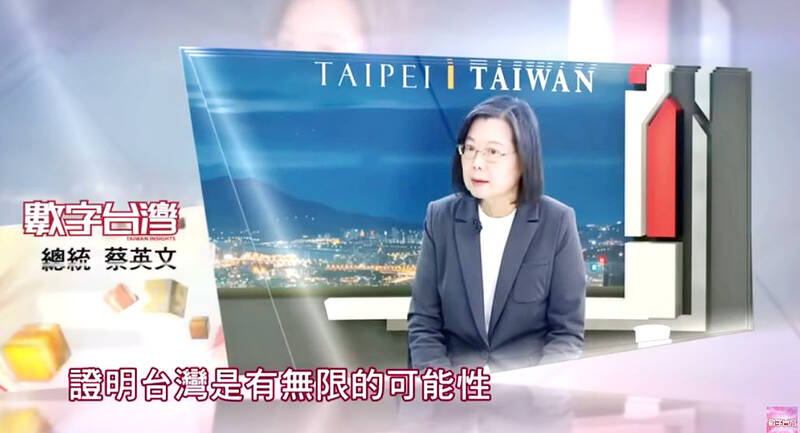Taiwan is preparing to develop its next generation of indigenous fighter jets, President Tsai Ing-wen (蔡英文) said.
Tsai revealed the plan in an interview with Era News that aired on Sunday evening in which she reflected on her two terms in office.
Tsai highlighted the government’s resolve to build up Taiwan’s autonomy in the area of defense systems.

Photo: Screen grab from Era News’ YouTube channel
As part of that commitment, the government plans to start developing the next generation of fighter aircraft, she said, without giving details.
Under the government’s defense autonomy plan, it would take delivery of 66 Brave Eagle advanced trainer aircraft by 2026, Tsai said, adding that 27 have already been delivered.
“If [the plan] is interrupted, it would be difficult to resume,” the president said, expressing hope that the next president would continue to support the development of the nation’s defense industry.
Tsai, whose second and final presidential term ends on May 20, reiterated that her defense policy centers on Taiwan gaining “defense autonomy.”
When other countries are contemplating joining forces to safeguard Taiwan, the main question is always whether Taiwan is firmly committed to self-defense, she said.
The government’s efforts to bolster its defense systems are driven in part by its desire to prove its capabilities and commitment to protect itself, she said.
Taiwan in September last year unveiled the prototype of its first indigenous submarine — the Hai Kun (海鯤), or “Narwhal” — which Tsai said was a milestone in the country’s efforts to obtain defense autonomy.
Submarine construction calls for systematic design and integration capabilities, and it is an all-encompassing undertaking that requires talent, she said.
The Hai Kun is expected to be delivered to the navy by the end of the year, after testing is completed.
Tsai in the interview also talked about cross-strait relations, saying it is the biggest challenge for “every administration and president of Taiwan.”
She said that bilateral relations essentially consist of two scenarios — either the positions of the two parties are in alignment and everything runs smoothly, or there is a conflict of interests.
When conflicts arise, it is crucial to manage the risks, she said.
Given the inherent differences in the relations between Taiwan and China, the government of Taiwan must navigate and mitigate those risks, she said.
Based on that perception, she adopted the position of “maintaining the status quo” across the Taiwan Strait when she took office in 2016, and she remains committed to that concept, she said.

A magnitude 7.0 earthquake struck off Yilan at 11:05pm yesterday, the Central Weather Administration (CWA) said. The epicenter was located at sea, about 32.3km east of Yilan County Hall, at a depth of 72.8km, CWA data showed There were no immediate reports of damage. The intensity of the quake, which gauges the actual effect of a seismic event, measured 4 in Yilan County area on Taiwan’s seven-tier intensity scale, the data showed. It measured 4 in other parts of eastern, northern and central Taiwan as well as Tainan, and 3 in Kaohsiung and Pingtung County, and 2 in Lienchiang and Penghu counties and 1

A car bomb killed a senior Russian general in southern Moscow yesterday morning, the latest high-profile army figure to be blown up in a blast that came just hours after Russian and Ukrainian delegates held separate talks in Miami on a plan to end the war. Kyiv has not commented on the incident, but Russian investigators said they were probing whether the blast was “linked” to “Ukrainian special forces.” The attack was similar to other assassinations of generals and pro-war figures that have either been claimed, or are widely believed to have been orchestrated, by Ukraine. Russian Lieutenant General Fanil Sarvarov, 56, head

‘POLITICAL GAME’: DPP lawmakers said the motion would not meet the legislative threshold needed, and accused the KMT and the TPP of trivializing the Constitution The Legislative Yuan yesterday approved a motion to initiate impeachment proceedings against President William Lai (賴清德), saying he had undermined Taiwan’s constitutional order and democracy. The motion was approved 61-50 by lawmakers from the main opposition Chinese Nationalist Party (KMT) and the smaller Taiwan People’s Party (TPP), who together hold a legislative majority. Under the motion, a roll call vote for impeachment would be held on May 19 next year, after various hearings are held and Lai is given the chance to defend himself. The move came after Lai on Monday last week did not promulgate an amendment passed by the legislature that

FOREIGN INTERFERENCE: Beijing would likely intensify public opinion warfare in next year’s local elections to prevent Lai from getting re-elected, the ‘Yomiuri Shimbun’ said Internal documents from a Chinese artificial intelligence (AI) company indicated that China has been using the technology to intervene in foreign elections, including propaganda targeting Taiwan’s local elections next year and presidential elections in 2028, a Japanese newspaper reported yesterday. The Institute of National Security of Vanderbilt University obtained nearly 400 pages of documents from GoLaxy, a company with ties to the Chinese government, and found evidence that it had apparently deployed sophisticated, AI-driven propaganda campaigns in Hong Kong and Taiwan to shape public opinion, the Yomiuri Shimbun reported. GoLaxy provides insights, situation analysis and public opinion-shaping technology by conducting network surveillance